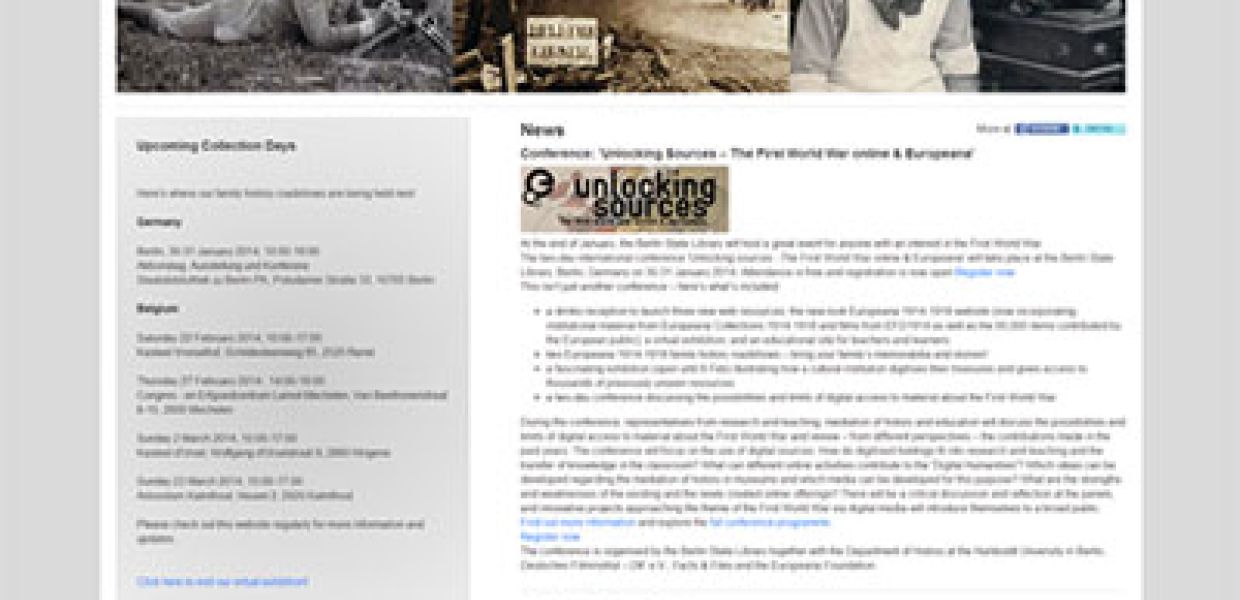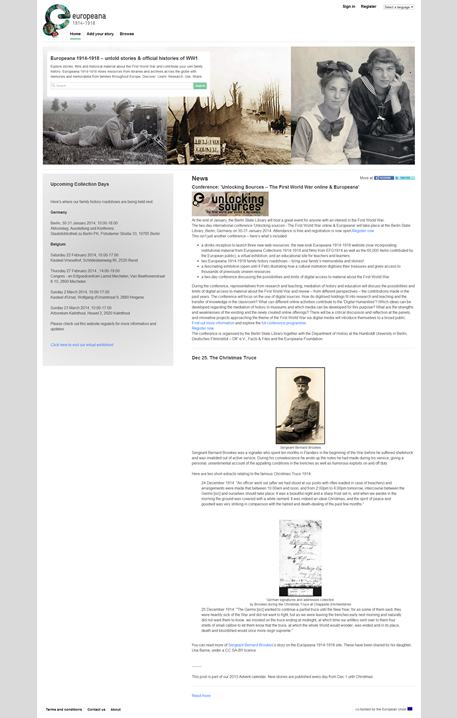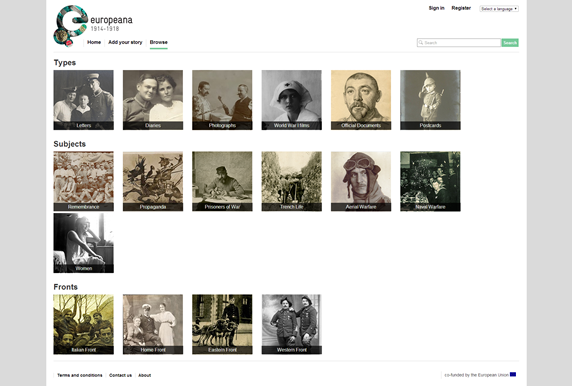The First World War Centenary: the site that brings all sides together launches in Berlin

The Deputy Federal Government Commissioner for Culture and Media, Günter Winands, today launched Europeana 1914-1918, an online resource that opens up hidden stories of the First World War and shows the tragedy that shaped Europe from different sides of the conflict.

Europeana 1914-1918 is the most important pan-European collection of original First World War source material. It is the result of three years of work by 20 European countries and will include:
- 400,000 rare documents digitised by 10 state libraries and two other partners in Europe
- 660 hours of unique film material digitised by audiovisual archives
- 90,000 personal papers and memorabilia of some 7,000 people involved in the war, held by their families and digitised at special events in 12 countries

The Minister of Culture, Monika Grütters, said on the occasion of the launch:
'Among the numerous projects the Federal Government of Germany is initiating and financially supporting during the current Centenary 2014, Europeana 1914-1918 is a highlight due to its pan-European dimension. It shows the stark difference between the European disruptions of that time and our way of cooperating nowadays. It is vital for the Government to point out, especially to young people, that today’s Europe is a union based on shared values, policies and justice. That’s the best way to avoid the wars, terror and fragmentation that Europe suffered in the 20th century. We don’t just want to show historical events, we want to use them for the present and the future. The Europeana project will help shape our views of that time and it will make a great contribution to the mutual understanding of the European people, despite the conflicts of history.'
Hermann Parzinger, the President of the Prussian Cultural Heritage Foundation to which the Berlin State Library belongs, said,
'The launch of the Europeana 1914-1918 is a visionary start to the commemoration year "1914.Aufbruch.Weltbruch" run by the Prussian Cultural Heritage Foundation and all its related institutions. The outcomes of the new website will be of long-lasting value. The worldwide access to this tremendous collection of highly relevant documents from the First World War offers a great basis for researchers and the general public to understand the events one hundred years ago.'
Europeana 1914-1918 is full of original source material – digitised photographs, maps, diaries, newspapers, letters, drawings and other content that can be used by teachers, historians, journalists, students and interest groups to create new resources. Already, the site is providing content for a new exhibition called The First World War: Places of transition and a new multilingual educational site developed by the British Library in London.
Jill Cousins, Executive Director of Europeana, said,
'It's a unique collection of raw materials – rare, fragile and hardly seen before. We’re encouraging everyone - history teachers, Wikipedians, apps developers - to use it in new ways. Most of the content is under an open licence, because we want people to re-use it to help broaden everyone’s understanding of our European past.'
The launch marks the beginning of an important programme of events to open this Centenary year:
30/31 January – two family digitisation days at the Berlin State Library, 10.00 – 18.00.
Anybody with family papers and memorabilia from the First World War can bring them along to be photographed and put online. The family digitisation days are from 10.00 to 18.00 on Thursday 30 and Friday 31 January at the Staatsbibliothek zu Berlin.
Also on the 30-31 January, the Staatsbibliothek zu Berlin is running the Unlocking Sources conference. It will be attended by 300 experts from across Europe. At the conference they will reflect on how online resources can add to our understanding of the conflict – including a session on whether video games harm or help our interpretation of the tragedy.
Barbara Schneider-Kempf, the Director General of the Staatsbibliothek zu Berlin – Preußischer Kulturbesitz said,
'Our partner libraries have provided a rich mix of materials, showing different sides of the historic conflict and never before seen together. This raw material will allow historians, curators, teachers, researchers and digital developers to shape new interpretations of the experiences of 1914-1918. Our Unlocking Sources conference is their first introduction to Europeana 1914-1918 and the opportunities it will offer them.'
Using the major War Collection of the Staatsbibliothek zu Berlin, the exhibition Unlocking Sources 1914-1918 – The Making Of shows how a cultural institution digitises their hidden resources and presents them online so everyone has access and can find new ways to use and share them.
As part of the exhibition, a specially made short film tells the story of the war writer Walter Flex, author of the acclaimed Wanderer zwischen beiden Welten (The Wanderer between Two Worlds), whose personal documents, including a bullet-holed map, letters, manuscripts and photographs, are preserved in the Staatsbibliothek.
The First World War on Film
In the evening of 30 January, delegates at the conference will have a special showing of selected films from the period, accompanied by the renowned pianist Eunice Martins in the Zeughaus Cinema.
These films, together with a further 660 hours of moving images, have been contributed to Europeana 1914-1918 by 21 European film archives under the direction of the Deutsches Filminstitut [DIF]. Director of the DIF Claudia Dillmann, said,
'The contribution that film makes to our understanding of the period is immense. Barely 20% of the silent film produced at the time has survived and most of the newsreels, documentaries, fiction and propaganda that we have put online have not been seen by the public for a century. We have also digitised anti-war films that reflect on the catastrophe at first hand.'
For more information, please see our press release
